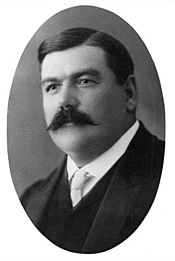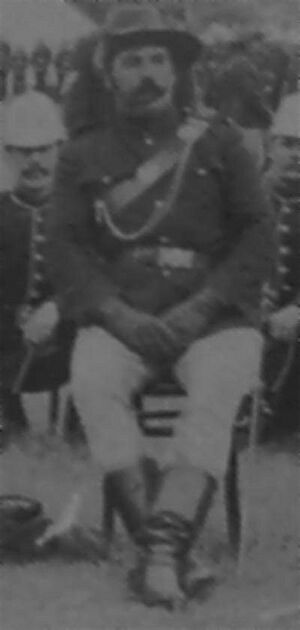Newton Moore facts for kids
Quick facts for kids
Major General
Sir Newton Moore
|
|
|---|---|
 |
|
| 8th Premier of Western Australia | |
| In office 7 May 1906 – 16 September 1910 |
|
| Monarch | Edward VII George V |
| Governor | Sir Frederick Bedford Sir Gerald Strickland |
| Preceded by | Sir Cornthwaite Rason |
| Succeeded by | Frank Wilson |
| Constituency | Bunbury |
| Member of Parliament for St George's, Hanover Square |
|
| In office 4 October 1918 – 25 November 1918 |
|
| Preceded by | Sir George Reid |
| Succeeded by | Walter Hume Long |
| Member of Parliament for Islington North |
|
| In office 14 December 1918 – 16 November 1923 |
|
| Preceded by | Sir George Touche |
| Succeeded by | William Henry Cowan |
| Member of Parliament for Richmond (Surrey) |
|
| In office 29 October 1924 – 13 April 1932 |
|
| Preceded by | Harry Thomas Alfred Becker |
| Succeeded by | Sir William Ray |
| Personal details | |
| Born | 17 May 1870 Fremantle, Western Australia |
| Died | 28 October 1936 (aged 66) London, England |
| Nationality | British subject |
| Political party | Unaligned (Western Australia) Conservative (United Kingdom) |
| Spouse | Isabella Lowrie |
| Relations | Sir Rodney Moore (son) |
| Profession | Surveyor |
| Civilian awards | Knight Commander of the Order of St Michael and St George |
| Military service | |
| Allegiance | Colony of Western Australia Australia |
| Branch/service | Western Australian Volunteers Citizens Military Force |
| Years of service | 1893–1918 |
| Rank | Major General |
| Commands | AIF Depots in the United Kingdom (1915–17) Intelligence Corps, 5th Military District (1908–14) 18th Australian Light Horse (1901–08) Mounted Half Company, Bunbury Rifle Volunteers (1900–01) |
| Battles/wars | First World War |
| Military awards | Colonial Auxiliary Forces Officers' Decoration |
Major General Sir Newton James Moore (born May 17, 1870 – died October 28, 1936) was an important Australian leader. He was a politician, a businessman, and a high-ranking army officer. Sir Newton served as the 8th Premier of Western Australia from 1906 to 1910. After fighting in the First World War, he became a member of the British Parliament, serving from 1918 to 1932. He was the father of Sir Rodney Moore.
Contents
Early Life and Career in Australia
Newton Moore was born in Fremantle, Western Australia. His father, James Moore, was an auctioneer and later the mayor of Bunbury. His mother, Elizabeth Dawson, was a schoolteacher. Newton went to primary school in Bunbury and then to Prince Alfred College in Adelaide, South Australia.
In 1886, he began training as a surveyor with Alexander Forrest. A surveyor measures and maps land. After finishing his training in 1894, he worked as a surveyor around the Bunbury area. In 1898, he married Isabella Lowrie.
In 1899, Moore was elected to the Bunbury Municipal Council. He then became the Mayor of Bunbury and served from 1900 to 1904. He also worked on a special committee about Forestry in 1903. From 1904 to 1905, he was the head of the Municipal Association of Western Australia.
Moore also had a long career in the military. He started as a private in the Bunbury Rifle Volunteers in 1894. By 1900, he was a captain. He helped create the Mounted Infantry Section, which later became part of the Western Australian Mounted Infantry (WAMI). After some changes in 1903, his unit was called the 18th (WAMI) Australian Light Horse. Moore became the commanding officer in 1908. He was promoted to lieutenant colonel. From 1908 to 1914, he led the 5th Military District Intelligence Section.
Becoming Premier of Western Australia
In 1901, Moore tried to win the Bunbury seat in the Western Australian Parliament but did not succeed. He tried again in 1904 and won. In August 1905, he became the Minister for Lands and Agriculture in the government led by Cornthwaite Rason.
When Rason resigned on May 7, 1906, Newton Moore became the Premier of Western Australia. He was only 36 years old, making him the youngest premier at that time. He had also been in parliament for less than two years, which was very unusual for someone becoming premier.
As Premier, Moore focused on helping farming grow in Western Australia. He kept the job of Minister for Lands and Agriculture himself. He made it easier for settlers to get cheap land. His government helped develop the Wheatbelt region, where a lot of wheat is grown. He also introduced an Income and Land tax, which helped the state's finances. This was a big step, even though some people in the Legislative Council (another part of parliament) did not agree.
In September 1907, Moore resigned as premier after a disagreement with the Legislative Council. However, the Governor, Sir Frederick Bedford, did not accept his resignation. So, Moore returned to his role. In 1908, Moore led his Liberal Party to win another election. This was good news for Western Australia, as there had been many different premiers in the years before. Moore helped bring stability to the government. He also held other roles, like Minister for Justice and Colonial Treasurer, before resigning as Premier on September 16, 1910, due to health reasons.
Agent-General and World War I Service
Newton Moore received special honors for his work. He was made a Companion of the Order of St Michael and St George in 1908 and a Knight Commander of the Order of St Michael and St George in 1910. Being knighted meant he could use "Sir" before his name.
In February 1911, he resigned from his seat in Bunbury. He then became the Agent-General for Western Australia in London. This job meant he represented Western Australia in the United Kingdom.
During the First World War, in 1915, the Australian government gave him another important role. He was put in charge of all Australian Imperial Forces in the United Kingdom. He held this position until 1917 and was promoted to the rank of major general.
British Politics and Later Life
In 1918, Sir Newton Moore left his role as Agent-General. The Conservative Party in the UK asked him to run for a seat in the House of Commons of the United Kingdom (the British Parliament). He won the seat for St George's, Hanover Square, in October 1918.
Later that year, in the general election, he ran for and won the seat of Islington North. After a short break from politics, he won the seat of Richmond upon Thames in 1924. He held this seat until he resigned in 1932. For ten years, he was the Chairman of the Standing Orders Committee in the House of Commons. He was known for being a great representative for Australia, and British leaders valued his advice on matters concerning the British Empire.
After leaving politics, Sir Newton Moore became the President of the British Empire Steel Corporation. He was also a director for several other important companies. He passed away on October 28, 1936, in London, after having surgery.
Newton Moore Senior High School in Bunbury is named after him, honoring his contributions.
See also
- 1916 Pioneer Exhibition Game
 | Dorothy Vaughan |
 | Charles Henry Turner |
 | Hildrus Poindexter |
 | Henry Cecil McBay |


